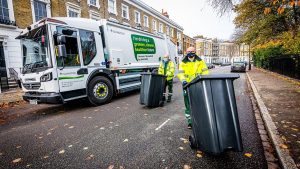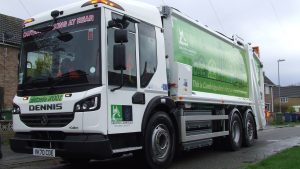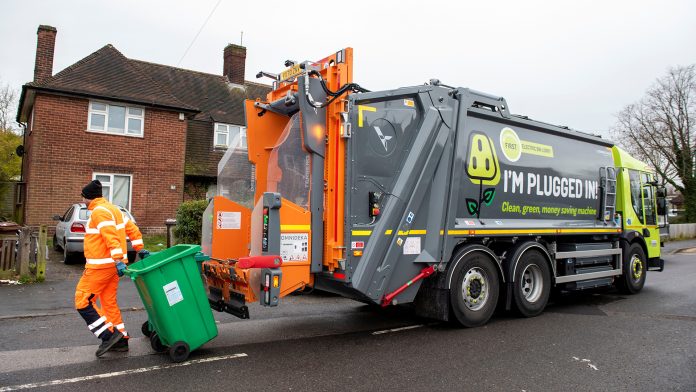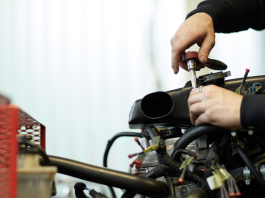Lee Rowland, Sales Manager, Dennis Eagle, discusses the benefits of electrification for heavy goods vehicles.
With close to 200 fully electric heavy goods vehicles now on the road, one UK commercial vehicle manufacturer is showing decarbonisation in the sector is a compelling choice.
Despite years of scepticism, the last 12 months have seen electrification truly start to take hold in the heavy goods vehicle sector.
A glance at recent SMMT figures rubberstamps the fact that fleet operators are finally baking electrification into their plans in anticipation of legislation that really isn’t that far away in fleet lift cycle terms.
Factor in the push from corporations and local authorities to achieve decarbonisation goals, and it is little surprise that demand in the UK for new HGVs grew by 14.9% in the third quarter of 2023. That’s a further 11,531 commercial EVs joining the vehicle park.
It’s a trend that isn’t restricted to the UK. Bloomberg recently reported how China has spent the last few years seeking the optimum way for it to decarbonise heavy trucks. Just as we saw with passenger cars there, it will then push out the preferred strategy that works best for the country.
Some 5,600 electric or fuel cell medium and heavy-duty trucks were sold in China in December 2023 alone. That took the total for all commercial EVs to over 330,000 for the year, suggesting the policy is in full swing. The rest of the world might have some catching up to do.
Reshaping perceptions about the future of electrification
Despite the clear benefits of emissions reductions, the road to decarbonisation hasn’t been the smoothest. Recently, examples of high-profile repower firms and electric startups going into administration have arguably dented the confidence, somewhat unfairly, as to the viability of such vehicles.
Yet one UK manufacturer has, just like its trucks, been quietly and efficiently building trust and confidence in its fully electric offering.
Now, with close to 200 of its fully electric refuse trucks in the UK, eCollect from Dennis Eagle is transcending pilot projects and small batches of converted trucks and a testament to how electrification is ready to seamlessly integrate into demanding operational environments.
With an increased focus on sustainable practices to mitigate the effects of climate change, local authorities are pushing to reach net zero targets. Although there are currently no net zero statutory targets for local authorities, many have signed up to a commitment to reduce carbon emissions. For many authorities, a significant element of carbon emissions comes from their vehicle fleets, including their refuse vehicles.
Electrification offers an advantage for heavy goods vehicles
Over time, numerous sources of power for heavy goods vehicles have been considered or used, including CNG, hydrogen or dual fuels.
More recently, with advancements in technology, electrification has emerged as a promising solution to revolutionise refuse truck operations, offering numerous benefits for both the environment and public health.

With such trucks having to operate where people live and work, mitigating local emissions is important. Electric trucks produce zero tailpipe emissions. By eliminating exhaust emissions and reducing noise pollution, electrification enhances the quality of life for residents and workers alike.
Given that many collections start early, the noise benefits of electric trucks hold great appeal, too, notably in populated urban areas where housing might be closer to the road than in more rural areas.
Fit for purpose
The operating environment of such trucks makes electrification a viable and appealing source of power. Typically, heavy goods vehicles operate for up to eight hours a day, collecting up to 1000 bins before returning to the depot.
Trucks such as the eCollect, which uses a proven 300kWh Li-NCM battery, have been shown to work for up to eight hours and then travel back to the depot to charge, with plenty of capacity to cater for any unforeseen circumstances.
In some applications, double shifts have been completed without recharging. Refuse trucks, with their frequent stops and starts, can harness regenerative braking technology to recover energy during deceleration, thereby extending battery life and reducing energy consumption.
Moreover, commercial EVs have fewer moving parts, resulting in lower maintenance costs and simplified increased reliability, further enhancing operational efficiency. Some operators have found the instant torque not only offers a smoother driving experience but helps drivers complete their rounds up to 45 minutes quicker.
Counting the cost
While the initial investment in electric refuse trucks is higher than diesel equivalents, typically, it costs less than half as much to travel the same distance in an electric vehicle than a conventional one.
Electric refuse trucks do not have a diesel engine or exhaust system, so they do not need the elements that make these systems run smoothly, such as AdBlue, DPF filters, and regular engine oil changes. They also don’t have as many moving parts as conventional vehicles, which are often prone to wear and tear and can significantly increase conventional RCVs’ operational costs.
Increasing appeal
The appeal of such trucks only increases once they are in service. Dennis Eagle has close to 200 operating in the UK, and fleet operators are coming back for more EVs. In addition to Nottingham placing further orders, Cardiff Council was another early adopter to place an order, with its first entering service in April 2021. Less than three months later, it had ordered five more.
Firsthand experiences from users, including prominent entities such as Westminster Council, where eventually 40+ eCollects will operate and be powered by the waste they collect, shed light on the tangible benefits of electrification.
Despite the setbacks faced by some repower and conversion projects, projects such as eCollect exemplify that electrification has a firm place in heavy goods vehicles and beyond.

By offering a compelling solution to transform refuse truck operations, delivering environmental, economic, and social benefits for communities in the UK and beyond By reducing emissions, enhancing energy efficiency and supporting decarbonisation strategies, electric refuse trucks arguably represent a significant step towards achieving a sustainable and resilient waste management infrastructure. Electrification emerges as a cornerstone of the transition towards a greener future.









